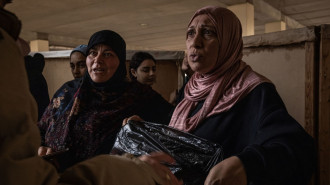Domestic workers death rate 'doubles' in Lebanon
The latest statistics were reported by humanitarian-focused news agency IRIN in a report documenting the plight of domestic workers.
Many of the deaths are caused by suicide or through botched escape attempts, as migrant domestic workers, nearly exclusively women, seek to free themselves from abusive and exploitative working conditions.
Lebanon is home to around 200,000 domestic workers, most of whom migrate from Ethiopia, the Philippines, Bangladesh, Sri Lanka, and Nepal to work as maids.
Once in Lebanon, women from these countries are bound by the Kafala system, a sponsorship structure which links a valid immigration status to one single employer.
As such, domestic workers may not leave the house without the permission of their employers, while any attempt to seek redress or help could jeopardise their legal status.
Around 65 percent of domestic workers say they have experienced a situation of forced labour, servitude, or slavery during their time in Lebanon, KAFA, a Lebanese women's rights group, says.
While local NGOs have worked to combat exploitative attitudes and practices towards migrants, little has changed. Between January 2016 and April 2017 the bodies of 138 migrant workers were repatriated following their deaths, according to IRIN.
"It was hell," Rahwa from Eritrea said. "Many are going crazy. Even when they run away, they live in rooms with six or seven people stuck together. That makes you crazy too."
 |
It was hell... Many are going crazy. Even when they run away, they live in rooms with six or seven people stuck together. That makes you crazy too |  |
The 37-year-old previously worked for a wealthy family in Tripoli but received no salary, days off, and was forced to sleep on the kitchen floor. She was also sexually harassed by her employer and beaten by her "madam".
After escaping she registered as a refugee and leads an informal migrant workers' church in Beirut.
KAFA is currently the only NGO recording the deaths of migrant workers, which are usually barely reported in local media.
Suicides are also difficult to document as most take place in their employers' homes.
Lebanon's intelligence agency, General Security, normally closes the file on migrant worker deaths within 24 hours with no further investigation, making it hard to identify the worker and notify their family or relevant embassy.
Ethiopia has banned its citizens from working in Lebanon, while Nepal, the Phillippines, and Madagascar have all tried a similar approach.
Yet the number of migrant workers in Lebanon rose from 130,000 in 2014 to 170,000 in 2016, according to IRIN. If Ethiopians come as tourists they can usually obtain a work visa once they are in the country.
In March, a video filmed by a Kuwaiti woman of her Ethiopian housemaid falling from the seventh floor window went viral, drawing attention once again to the mistreatment and abuse that migrant workers face under the sponsorship system.
The maid had attempted to escape via the window after her employer locked her in the house.

![Palestinians mourned the victims of an Israeli strike on Deir al-Balah [Getty]](/sites/default/files/styles/image_684x385/public/2024-11/GettyImages-2182362043.jpg?h=199d8c1f&itok=xSHZFbmc)


![The law could be enforced against teachers without prior notice [Getty]](/sites/default/files/styles/image_684x385/public/2178740715.jpeg?h=a5f2f23a&itok=hnqrCS4x)
 Follow the Middle East's top stories in English at The New Arab on Google News
Follow the Middle East's top stories in English at The New Arab on Google News


